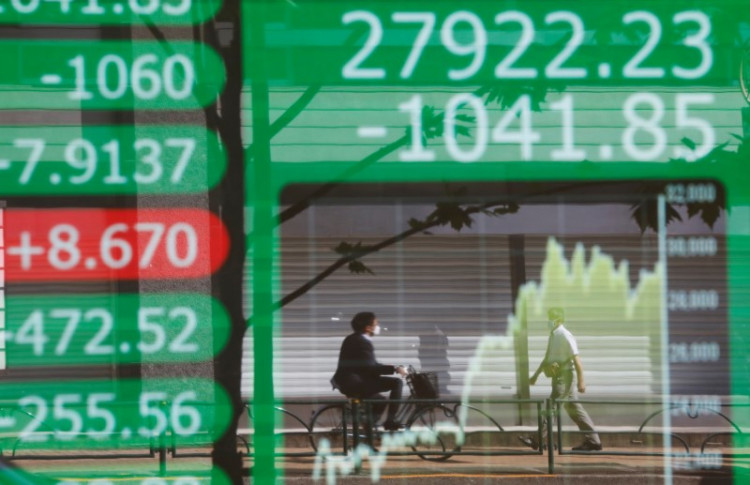Global markets plunged Monday as the ripple effects of President Donald Trump's sweeping tariff policy deepened a historic selloff, with investors dumping shares from Hong Kong to Frankfurt amid growing fears of a full-scale global trade war. The selloff wiped out more than $5.4 trillion in value from global equity markets and pushed major U.S. stock indexes closer to bear territory.
In Asia, Hong Kong's Hang Seng Index posted a staggering 13.2% loss-the worst single-day drop since the 1997 Asian financial crisis. Japan's Nikkei 225 closed down 7.9%, while the Shanghai Composite fell 7.3%. Taiwan's Taiex shed 9.7%, its largest recorded daily decline. Nearly every major Asian equity market saw heavy losses, with South Korea's Kospi falling 5.6% and Australia's ASX 200 dropping 4.2%.
"Washington's shock decision to impose a 34% tariff on Chinese goods dealt a direct blow to core export sectors like semiconductors and EVs," wrote Dilin Wu, research strategist at Pepperstone. "Trading volumes in Hong Kong surged, a clear sign of widespread forced liquidations and what can only be described as a full-blown panic."
European indexes followed suit. Germany's DAX slid 9%, the FTSE 100 lost nearly 5%, and France's CAC 40 dropped 5.8%. In the U.S., futures pointed to another dismal open on Wall Street, with S&P 500 futures down nearly 2%, the Dow off 2.3%, and the Nasdaq sliding 2.1%.
The market volatility was sparked by the White House's April 2 decision to impose a minimum 10% tariff on all U.S. imports, including specific 34% levies on Chinese goods. China retaliated Friday with matching tariffs, triggering investor alarm about inflation and slowing global growth. "China and the U.S. are now locked in a game of chicken," warned analysts at Pantheon Macroeconomics, who noted the risk of a prolonged global trade war.
President Trump, speaking aboard Air Force One, denied wanting to destabilize markets. "What's going to happen with the market? I can't tell you," he said. "But I can tell you, our country has gotten a lot stronger, and eventually it'll be a country like no other."
Pressed on what might end the tariff standoff, Trump said, "I'm willing to deal with China, but they have to solve their surplus." Last year, the U.S. imported $438.9 billion in goods from China and exported $143.5 billion, creating a trade deficit of nearly $295 billion, according to the Office of the United States Trade Representative.
Commerce Secretary Howard Lutnick told CBS's "Face the Nation" Sunday that the tariffs are "definitely going to stay in place for days and weeks," and said the administration is "resetting global trade." At least 50 countries affected by the latest tariffs have reportedly reached out to Washington for talks.
Not all policymakers were supportive. Billionaire investor Bill Ackman warned of "an economic nuclear war," saying in a post that Trump's broad and simultaneous targeting of allies and adversaries was "destroying confidence in our country as a trading partner."
While Trump has hinted that deals could be made on a country-by-country basis, he declined to commit to any immediate concessions. Japanese Prime Minister Shigeru Ishiba said he plans to visit the U.S. "as soon as possible" to address the 24% tariffs set to hit Japanese goods later this week.
Barclays economists warned that countries such as South Korea and Singapore may struggle to win tariff exemptions, and the bank has begun trimming growth forecasts for the region.
Meanwhile, oil prices slumped further Monday, with Brent crude falling 2.4% and U.S. benchmark WTI down 2.5%. Even gold, usually a haven in times of market turbulence, slid more than 4% to near $3,030 an ounce.
The U.S. average tariff rate is now at its highest since 1909, according to the Yale Budget Lab. The S&P 500 has dropped 14% in the past week, the Dow 12%, and the Nasdaq 16%, pushing the tech-heavy index into bear market territory.




